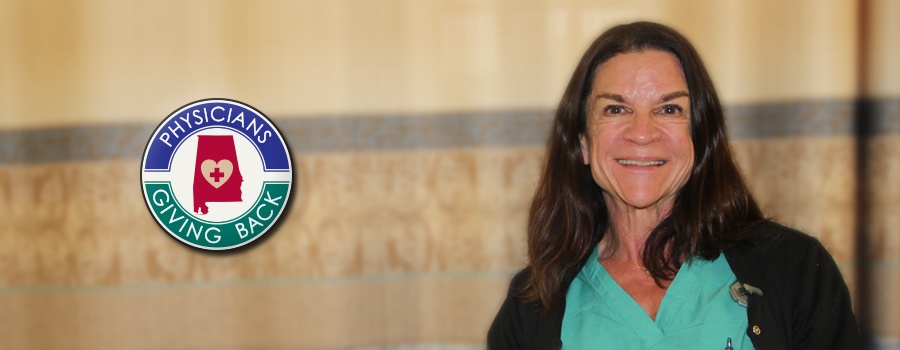TUSCUMBIA – When you walk into Dr. Suzanne Blaylock’s office at the Helen Keller Pavilion, there’s a medical journal on her desk, paused and waiting for her to return to continue reading the most recent article. On the wall behind her chair are framed reminders of why she choose anesthesiology as her specialty – awards recognizing her from the Peer Reviewed Professionals, the Consumers’ Research Council of America as one of America’s Top Anesthesiologists, and the Consumers’ Research Council of America’s Top Physicians. Dr. Blaylock always knew she’d have a career in medicine, but what she got was so much more.
“I started out in the medical field as a nurse,” Dr. Blaylock explained. “My father had taken nursing courses back in his day, but it wasn’t for him. He suggested I take the courses and he’d pay for them. I knew I wanted to do something in the sciences because I’ve always felt I had that mindset for it.”
After getting her Associate’s degree in Chattanooga, she moved to Birmingham and worked at Carraway Hospital. She started working toward her Bachelor’s degree when someone suggested the idea of a career in anesthesia. It wasn’t long before she realized that maybe a turn toward medical school would be a better choice.
“I really liked working in anesthesia, I mean, that was definitely the specialty I wanted to work in. But back then, as an anesthesia nurse, there was no real way to move up other than to become a doctor. So, I went back to UAB and started taking night classes,” Dr. Blaylock said.
Her experience as a nurse was definitely a valuable one, especially in the hospital setting as a medical student. Procedures, terminology and the day-to-day operation of a hospital were easier for her with her background and helped provide a better direction through medical school, she said. And, she continues to draw on those experiences even now when students from the state’s medical schools come to work with her and her colleagues.
“We get students from ACOM to come up and work with us, and that’s really good experience but not just for them. We enjoy getting to work with our students, because it gives all of us a chance to express ourselves in what we do every day, plus everyone gets a learning opportunity. Not only do these students learn from us, but surprisingly, there are some things we can learn from them. All the medical schools here in this state are just superb, but I think the students get a great perspective when they visit rural areas like Tuscumbia that are either on the cusp of revitalization or trying to expand to help their residents,” Dr. Blaylock said.
As settled in as she may be into the Tuscumbia area, one might easily take Dr. Blaylock for a small town girl. You’d be absolutely correct. Originally from a small town just outside of Chattanooga, her small town roots run deep…and so do her stories of home.
“My mother was a baker, and she worked at Little Debbie in Chattanooga. In fact, I went to school with Little Debbie, and I worked there, too!” she laughed. “Mom used to hand roll those cakes in the bakery. I worked in the micro lab. The first course I took right out of high school was microbiology, and there was a microbiology lab right there in the bakery. Little Debbie was really very innovative for its time. All the ingredients were tested for things like salmonella or mold counts on the chocolate, and then we’d go out and test the finished cookies. I’m sure companies do this now, but back then no one else did. The thing about Little Debbie – that finished product never had a germ on it!”
So, working in the best little bakery in the South right out of high school was probably the most amazing job in the world for a teenager, right? Absolutely! Dr. Blaylock said it was a dream job, but it probably contributed to her weight problem that followed her through her adult years. Like many medical professionals, eating a balanced diet may be with the best of intentions, but it may not always be what happens during the day.
“I had gotten out of shape, and I had always struggled with my weight. You try to diet, but you stop and start and stop and start, and then you just feel desperate because nothing is working. So a friend asked me to go to Weight Watchers with her. I thought I could just do this now, or I’m not going to do it at all. We had a dynamic leader, and my friend and I did it on the buddy system. Then it became more of a habit than a chore. Unfortunately for us in the medical field, we tend to eat prophylactically. It’s like, ‘I’d better eat now because I don’t know when I’ll get another chance!’” she laughed. “I ended up losing over a hundred pounds, but I didn’t keep it all off because now I have more muscle. I started working out more at the gym. I guess I must be highly suggestable because a friend at the gym suggested I do some triathlons. And then my coach suggested I try body building.”
Yes, body building, which Dr. Blaylock calls “a good hobby and a good stress reliever.” In fact, last year she became the 2016 National Physique Committee Masters Over 60 Figure Champion, and she’s competing again to defend her title in Puerto Rico later this month.
“If I had started doing body building in my 20s, I might be a coach now with endorsements, but it’s not like I’m going to try out for the Olympics,” Dr. Blaylock laughed. “I’m certainly not going to quit my day job, but it’s a lot of fun and I enjoy competing. Everyone should be able to do something for themselves that they enjoy.”
